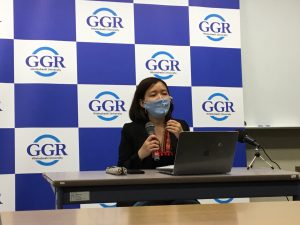On April 28, 2022, the Institute for Global Governance Research (GGR) hosted a dialogue session of Ms. Hnin Htet Htet Aung, a visiting researcher at the Graduate School of Law, with Hitotsubashi undergraduate students on the topic “What’s going on in Myanmar?”
With the participation of about 50 students, a large number of questions were raised throughout the session. A fourth-year undergraduate student mentioned that people in Japan and elsewhere seem to pay less attention to what’s going on in Myanmar. In response, Ms. Aung explained that “the Myanmar community in Japan is supporting the movement of Myanmar people to resist the military, raising their voice to Japan and international community.”
Another student asked what kind of diplomatic approach Myanmar could take as it moves toward democracy after the civil war. Ms. Aung replied, “It is difficult to predict what will happen after the coup, but we will discuss how various groups share power in the process of moving toward a federal state.” Regarding the question of how to achieve equality among diverse groups, Ms. Aung responded, “Language and education issues are important to achieve equality, and the fact that ethnic minorities have already started to have university curriculum in their own languages is an example of how this process can proceed. Allocating national resources will be an important issue as well.”
During the session, many students wanted to know how effective the economic sanction on Myanmar is. One mentioned, “It might be effective on the macro level, but citizens and the business sector are having great difficulties.” Ms. Aung responded, “Sanctions aside, cash shortage is also one of the pressing problems for Myanmar people since Central Bank of Myanmar is reluctant to increase the supply of cash. For example, people could not withdraw money from ATMs to make purchases, so we had to make payments online. However, we must cut off funds to the military.”
How have the daily lives of citizens changed since the coup? Ms. Aung illustrated that “Myanmar people spent the summer without air conditioning because the military cut off the electricity. We could not even recharge our computers. For the first week after the coup, internet access was only available from 9:00 to 11:00. For three hours right after the coup, the military blocked the Internet and phone lines. The military inflicts such inconveniences in order to keep citizens on its side. However, citizens do not send their children to school. Instead, students participate in online programs [offered] by the National Unity Government (NUG) and civil societies, where they learn about federalism, the Constitution, and democracy online.”
Regarding whether many students are supporting the anti-government movement in Myanmar, Ms. Aung said that “most students are supporting democracy, and the 88 Generation are currently facing many crises.” In reply to a question on the Rohingya issue, Ms. Aung answered that “it will be also difficult for Rohingya refugees to return to Myanmar until the situation stabilizes.”
Responding to a question on the role of the media, Ms. Aung said, “The media can do a lot for the citizens of Myanmar. Almost every Myanmar citizen now has a role to play in informing people at home and abroad about what the military is doing by taking video and photographs and sending them. Citizen journalists are playing a very important role.” Finally, Ms. Aung regretted the situation in Myanmar where the right to vote, a fundamental right, is not protected and asked as many students as possible to vote. Then she asked the students to stand with the Myanmar people and show their encouragement through social media in order to extend such messages to the Myanmar people.
【Event report prepared by】
JEONG Minhee (Ph.D. student, Graduate School of Law, Hitotsubashi University)

